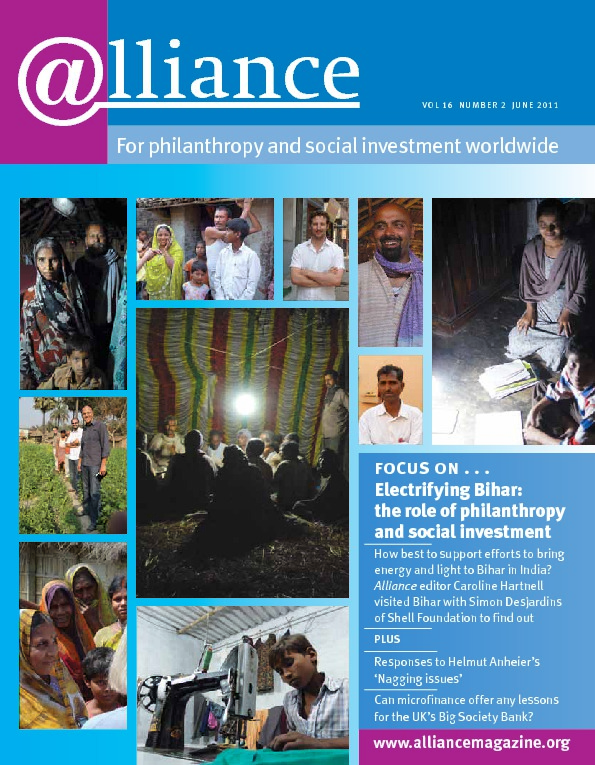Investors wanting to invest in access to energy in India face many challenges, including the lack of an easy exit, the need for ‘patience’ and the lack of transparency. But perhaps the biggest challenge is the lack of organizations that are ready for investment. The key to progress seems to be increasing the number of social enterprises and getting them off the ground – hence the need for investors ready to invest at an early stage, both grantmakers and social investors.
For social investors in this space, what is needed in projects is ‘commercial viability and a good service that impacts the low-income community’, says Keith Allman of Bamboo Finance. This is echoed by Ross Baird of First Light Ventures (an independent fund within Gray Ghost Ventures). ‘We only look at a business if it provides substantial improvements in the lives of people in poverty,’ he says. ‘Then we look for the most commercially viable of these, as the best use of our funds.’ Their goal is ‘to achieve the same return as from a Silicon Valley investment’. This combination is the key to sustainability, according to Richenda Van Leeuwen, senior director of the Energy Access Initiative at the UN Foundation. ‘Well-meant projects with no sustainable market mechanism are no good,’ she says. ‘Social investors need to be savvy investors: they must do their homework and check they are backing the right people.’
The lack of ‘investment-ready’ projects is referred to by many of the people we spoke to. Among them is Vineet Rai, founder of Aavishkaar (see interview), who identified this as ‘the most critical question’ and founded a company called Intellecap in 2002 specifically to ‘identify people who are doing innovative work and take them through a process of mentoring and developing their business plans’. ‘I think the biggest challenge is to find the entrepreneurs, to get more Mr Pandeys,’ said Deepak Gupta, Secretary of the Ministry for New and Renewable Energy (see interview).
Karan Gupta, founding partner of the newly established Breathe India Ventures,
has looked at 100 social entrepreneurs in the last 18 months and has yet to close a deal – though he has a couple of organizations shortlisted. ‘Entrepreneurship is new in India and entrepreneurs are not financially savvy,’ he says. ‘Many have ideas that are very theoretical; the documents they present don’t really amount to a business plan or a financial forecast. They don’t have a macro view of their industry or any clear idea of who their competitors are.’ However, among these, he says, there are companies doing some brilliant work without any access to external capital. For all these reasons, Breathe India will be focusing on offering early-stage equity in the clean tech sector.
According to Keith Allman, Bamboo Finance is also considering setting up an early-stage fund. When he joined Bamboo, he says, he noticed ‘that some of the work was very early stage, really “incubation” strategies’ and there seemed to be a great need for this sort of investment. The new fund can be seen as a response to this situation. He also wonders if this incubatory role could also be filled by grants. ‘The new fund is early stage,’ he says, ‘but perhaps still not quite seed “zero” funding, so there could be a role for grants it as well.’ This is of course the role that Shell Foundation played with Husk Power.
The lack of easy exit
Social investors generally have to wait a long time for ‘exit’ – hence the term ‘patient capital’. Social businesses grow very slowly compared to other businesses, points out Neera Nundy of Dasra. ‘The margins are small with BOP (bottom of the pyramid) customers, so you need high numbers for an enterprise to be sustainable.’ In India, she says, ‘you have to sit on investments for a long time. Investors must be patient, even compared with impact investing in the US or UK.’ According to Richenda Van Leeuwen, investors often want 19-20 per cent returns to offset this level of risk, ‘which can exclude valuable social enterprises’. What are needed, then, are patient investors, led by the needs of the entrepreneurs, and willing to accept single-digit financial returns that instead maximize the social good provided by the entity.
Jacqueline Novogratz of Acumen sees investor expectations as a growing problem. ‘There is a tendency,’ she says, ‘to stress the financial returns that impact investing can bring over the social returns. An organization like Husk Power restores the balance: the real purpose is to solve the problem, to meet the need in question.’
But Mandeep Singh of d.light doesn’t see this as too much of an issue. Even with those he sees as ‘fully commercial’ funders, he sees them as ‘commercial with a heart, with an interest in improving the lives of the poorest. They understand that India is a difficult market and it’s a long haul and they’re ready to wait.’ But he emphasizes that even if a social enterprise is a good long-term investment – as d.light is widely seen as being – it is not for someone wanting a quick return.
Ashden Trust
 Founded in 1989, the Ashden Trust makes grants to organizations with a track record of delivering innovative and effective projects, primarily in the areas of climate change, sustainable development, or improving the quality of life in poorer communities. The Ashden Awards recognize excellence in the field of local sustainable energy. Previous Indian winners include d.light design (which produces the combined lamp and phone charger pictured) , Saran Renewable Energy, IDEI and SELCO. In July last year, 16 past Ashden winners came together to launch the Ashden India Collective. Ashden tries to give winners business support, including help with access to finance.
Founded in 1989, the Ashden Trust makes grants to organizations with a track record of delivering innovative and effective projects, primarily in the areas of climate change, sustainable development, or improving the quality of life in poorer communities. The Ashden Awards recognize excellence in the field of local sustainable energy. Previous Indian winners include d.light design (which produces the combined lamp and phone charger pictured) , Saran Renewable Energy, IDEI and SELCO. In July last year, 16 past Ashden winners came together to launch the Ashden India Collective. Ashden tries to give winners business support, including help with access to finance.
For more information
http://www.ashdentrust.org.uk
http://www.ashdenawards.org
Breathe India Ventures
Founded in 2009, Breathe India Ventures is a social venture capital fund that aims to invest early-stage patient capital in impact-oriented Indian business models in the clean technology sector. The success of the businesses is measured both by economic viability and by social and environmental impact, employing strict impact measurement metrics. Breathe India provides access to finance, relevant management and entrepreneurial expertise, and exposure to government personnel, successful entrepreneurs and consultants.
For more information
http://www.breatheindiaventures.com
Gray Ghost Ventures
Gray Ghost Ventures’ mission is to invest collaboratively in innovative, early-stage enterprises that contribute to the well-being of low-income communities in emerging markets as well as providing an attractive financial return. Its areas of interest include microfinance, affordable private schools and social venture investment. The GGV-DOEN Cooperatief makes $1 million to $3 million investments in early technology. First Light Ventures, an independent fund affiliated with Gray Ghost Ventures, makes investments of up to $100,000 in early-stage entrepreneurs. Its investments in India include d.light design, which it has helped with accessing more commercial capital.
For more information
http://www.grayghostventures.com


Comments (0)